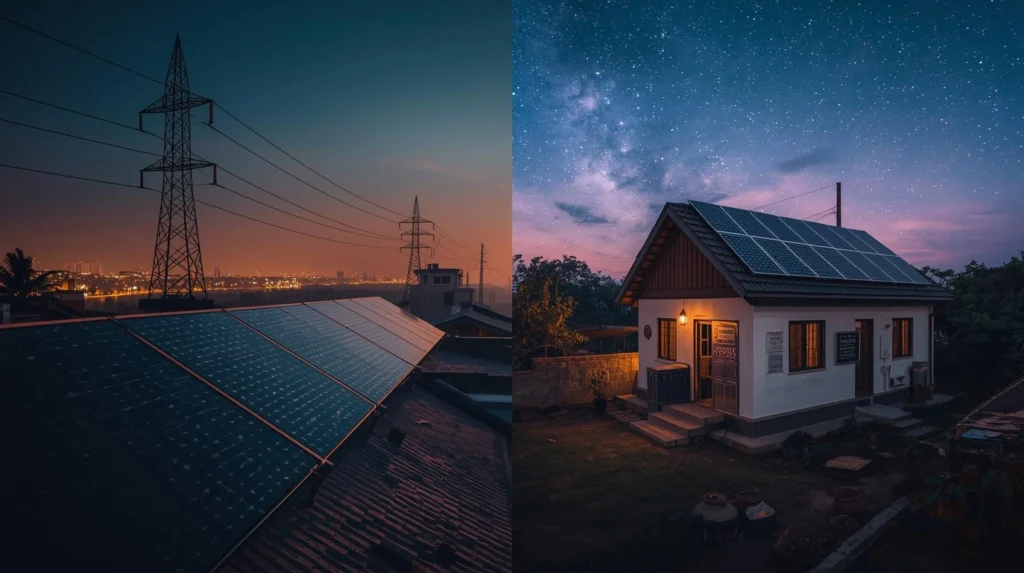
Introduction
Solar energy is no longer just an alternative — it has become a mainstream power solution for Indian homes, businesses, and industries. But if you’re planning to go solar, the first big question is:
👉 Should you choose an Off-Grid Solar System or an On-Grid Solar System?
Both systems help you generate your own electricity, but they differ in function, cost, and benefits. In this blog, we’ll provide a complete comparison of Off-Grid vs. On-Grid solar systems, tailored to Indian conditions, so you can make the right decision.
🌟 What is an On-Grid Solar System?
An On-Grid Solar System (also called Grid-Tied) is directly connected to the government’s electricity grid.
- How it works:
- Solar panels generate electricity.
- Power is consumed by your home/office first.
- Excess electricity is sent back to the grid through Net Metering.
- During nights or cloudy days, you use power from the grid.
- Key Benefits:
✅ Lower upfront cost (no battery required).
✅ Net Metering reduces electricity bills drastically.
✅ Easy maintenance.
✅ Best suited for urban and semi-urban homes. - Limitations:
❌ No power backup during blackouts (since system shuts down for safety).
❌ Relies on the availability of a government grid.
🌟 What is an Off-Grid Solar System?
An Off-Grid Solar System is completely independent of the government grid. It uses batteries to store electricity for use at night or during cloudy days.
- How it works:
- Solar panels generate electricity.
- The energy is stored in batteries via a charge controller.
- Stored power runs appliances when sunlight isn’t available.
- Key Benefits:
✅ Full independence from the grid.
✅ Works in remote/rural areas with poor electricity supply.
✅ Provides backup during power cuts. - Limitations:
❌ Higher cost (batteries are expensive).
❌ Battery maintenance is required.
❌ Limited storage — excess generation may go waste.
🌟 Side-by-Side Comparison Off-Grid vs On-Grid Solar System
| Feature | On-Grid Solar System | Off-Grid Solar System |
|---|---|---|
| Connection | Connected to government grid | Independent, uses batteries |
| Cost | Lower (no battery cost) | Higher (battery cost) |
| Power Backup | ❌ No backup | ✅ Backup available |
| Best For | Cities, towns with reliable electricity | Remote/rural areas with frequent outages |
| Government Subsidy | Available under MNRE | Limited (depends on state policy) |
| Maintenance | Low | Medium (battery care) |
| Return on Investment | Faster (3–5 years) | Slower (5–7 years) |
🌟 Which One Should You Choose?
- Choose On-Grid If:
- You live in a city or town with reliable grid electricity.
- Your main goal is to reduce electricity bills.
- You want quick return on investment with net metering.
- Choose Off-Grid If:
- You live in a rural or remote area with frequent blackouts.
- You want complete independence from the grid.
- You are okay with higher investment for 24/7 power security.
🌟 Hybrid Solar Systems
In 2025, Hybrid Solar Systems are becoming popular. They combine features of both off-grid and on-grid systems.
- How it works:
- Connected to the grid.
- Includes batteries for backup.
- Lets you save on bills + enjoy uninterrupted power.
- Downside:
- More expensive than both options.
- But excellent for businesses, hospitals, or homes needing constant power.
Practical Cost Comparison (India 2025)
- On-Grid 5 kW System: ₹2.5 – ₹3 lakh (after subsidy, ROI in 3–4 years).
- Off-Grid 5 kW System: ₹5 – ₹6 lakh (due to battery cost, ROI in 6–7 years).
- Hybrid 5 kW System: ₹6 – ₹7 lakh (high upfront but versatile).
Conclusion
Whether you choose On-Grid or Off-Grid Solar System depends on your location, budget, and power needs.
- For most Indian households in cities → On-Grid Solar is the smartest choice.
- For rural/remote areas → Off-Grid Solar ensures energy independence.
- For businesses and high-demand users → Hybrid Solar provides the perfect balance.
At Yamira Solar, we provide end-to-end consultation, installation, and subsidy support so you can pick the best system for your needs.
👉 Visit: www.yamira.in
📩 DM us today for a free solar consultation.
FAQ
A1. On-grid systems are cheaper since they don’t require batteries.
A2. Yes, but you need to size the battery and inverter capacity properly.
A3. Subsidy is mainly for on-grid rooftop systems. Some states offer limited support for off-grid.
A4. Off-grid or hybrid systems are better since they provide backup.
A5. Typically 5–7 years, depending on usage and maintenance.